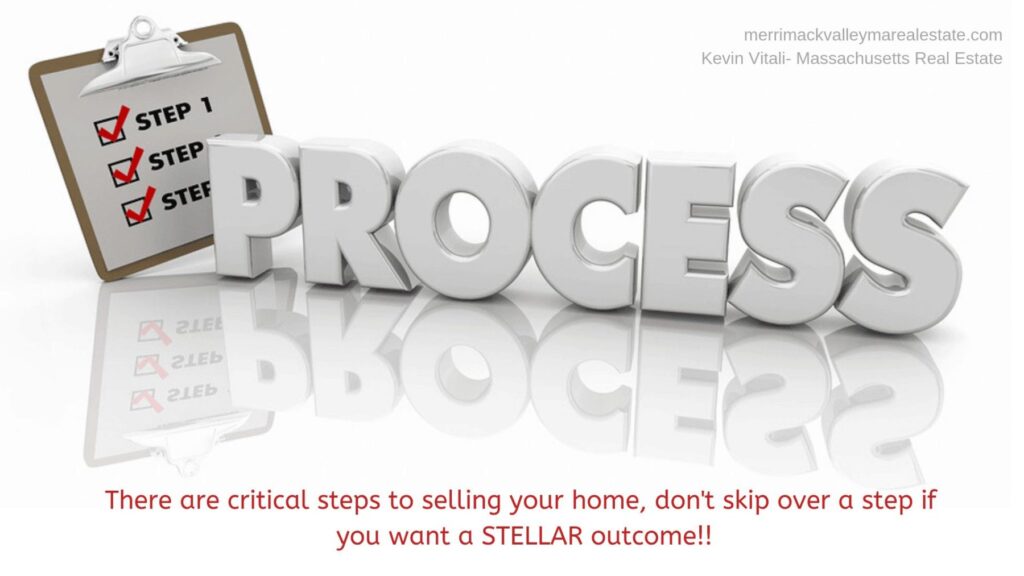 There is a certain process to selling your home. The home-selling process involves more than just calling an agent to slap a sign in the yard. Once you have the thought of selling your home, contact an agent and get an overview of the home selling process.
There is a certain process to selling your home. The home-selling process involves more than just calling an agent to slap a sign in the yard. Once you have the thought of selling your home, contact an agent and get an overview of the home selling process.
Make the home selling process work for you.
Most home sellers expect to get top dollar for their home and want it sold quickly with few hassles.
If this is your expectation when it comes time to sell your home don’t short the home selling process.
There is a process to selling your home for a reason. An experienced listing agent will put a carefully crafted plan in place to meet your goals.
The Home Selling Process Is Like Baking Bread
Like any process there are different steps to the process to produce ideal results.
If you ever baked bread, there is a very precise process that needs to be followed. Measure inaccurately, get the temperatures wrong, or skip any part of the process and you have either less than stellar results or possibly complete failure.
Well, selling your house has many, many steps to it, just as baking bread does. Each step needs to be handled with thought and care and none of process should be missed. If you short the home selling process, just like baking bread, you will have less than desirable results or even a home that expires unsold on the market.
Unfortunately every year, I get calls from sellers who just want to get the sign slapped up in their yard, skipping some key pieces to truly have a successful sale. The worst part is they have had it in their heads for months, or evening longer that they were selling. They should have contacted a REALTOR® at the first thought of selling.
The Home Selling Process
An experienced listing agent will have a precise plan to listing your home. They will know the current market conditions, what home buyer’s are expecting, how to price your home and much more… Your agent is the key to making sure the proper process is followed.
I break the home selling process into three critical pieces…. preparation, pricing, and presentation.
While there are three critical components of the home selling process, each will be broken down into steps along the way along with other steps to selling your home.
Preparation- Covers the process of getting your home ready to list from interviewing agents to preparing your home for sale.
Pricing- Selecting the right price on your home is a critical part of the home selling process. Working with your agent to review historical sales data will help you price your home properly for the current market.
Presentation- Delivering information to prospective home buyers is the presentation part of the home selling process. From professional real estate photos, properly entering it into the Multiple Listing Service to running a social media campaign, your home should have a high quality presentation to attract the right buyers.
After the 3 critical components you also still have to bring the sale to a successful close which includes more steps!
Skip or gloss over critical steps in the process and it will effect the final outcome of the sale of your home.

Explore If Selling Is a Viable Option
The first step is explore if selling is a viable option. First and foremost if you sell where will you go? Is it feasible for you to buy a house that you want? Or can you can secure a rental for the price you can afford?
For some sellers they just have to sell, for others selling is an option but not absolutely necessary. For those not necessary sellers make sure that selling makes sense from a financial standpoint as well as make sure you can achieve your housing goals.
You don’t want to sell your house out from underneath you to find you aren’t improving your situation.
Hire A Real Estate Agent
Hiring the right real estate agent is the key to successfully working through the home selling process. An experienced, successful listing agent will have a process to sell your home in place to walk you thru the sale of their home with as little hassle as possible.
Take the time and interview several agents. Hiring the wrong real estate agent will result in poor results and frustration.
Establishing Communication
Communication is critical between your listing agent and yourself. It is important to establish how you like to be communicated with as well as availability. You do not want miscommunication between you and your listing agent.
Remember in the internet age, time is of the essence. Showing need to be handled in a timely manner, questions from buyers need to be handled quickly and deadlines need to be met.
Don’t give a buyer the chance to move on to the next house that grabs their attention because it took you two days to answer a question. Or don’t disappear for 3 weeks on vacation when paperwork needs to be signed without putting a means in place to deal with paperwork in a timely manner.
Preparing Your Home
Work with your agent to prepare your home for the market. From the basic deep cleaning, de-cluttering and depersonalization to doing small repairs or even some minor renovation can drastically increase the appeal of your home and possibly net you more money.
Remember your home will be competing with other homes where the sellers have taken the time to properly prepare their homes for the marketplace. You want your home to stand out and preparing your home properly for the market is part of the process that should not be rushed or skipped.
Pricing Your Home
Pricing your home is a step in the process that should be considered very carefully.
You homes price should never be an arbitrary “just because” number. The price you choose to list your home at should be based on historical sales data of similar homes in your neighborhood. Your agent will prepare a Comparative Market Analysis to review with you and help guide you to selecting the right price.
I cannot re-iterate enough that pricing is based on historical sales data of similarly priced homes…. yes there is a rhyme and reason to how an agent prices a home.
Prepare Marketing Materials
Some of the marketing materials can be prepared while you are preparing your home, while one of the more important pieces that all of your marketing revolves around cannot. That one critical marketing piece is providing high quality, professional, real estate photos of you home.
Marketing your home is visual. And much of the marketing revolves around images of your home. You have the listing photos themselves, brochures, real estate videos, drone photography, etc…
While photos are a key marketing component, floor plans, property disclosures, community info and more will be compiled to help market your home.
The important thing to remember is it takes a little bit of time to pull these things together and do not necessarily happen over night.
Listing Your Home
Its now time to pull the trigger and announce your homes availability to the public. The first step is taking advantage of your local Multiple Listing Service and syndicated websites like Zillow, Trulia, REALTOR.
While every agent is a member of the MLS not all agents treat it the same. This is wear the rubber hits the road. Careful attention needs to be put into the listing photographs (even the order of the photos make a difference), the description and complete the listing in full and accurate detail.
Be real about what your house is and don’t make it something is not. Attract the right buyers.
Simultaneously your listing agent should be leveraging the internet with Facebook ads and promoting on social media as well as scheduling open houses, setting up an easy way to show your home, etc…
Showing Your Home
Realize you have captured a buyers attention, they have now scheduled a showing of your home. You have one opportunity to impress them or they are off to the next new listing.
Make sure you and your listing agent put a process in place where it is easy for other REALTORS® to show your home. Don’t let you or your agent make it impossible for other agents to gain entry.
Now that you have your showing scheduled make sure you home is show ready and make the most of that showing.
Fielding Questions
Buying a home is a big deal. If you have a buyer that is considering your home, they most likely will have a lot of questions.
Make sure you answer all questions in a timely manner as well as thoroughly, accurately and with great consideration. If the question is important a buyer’s agent will ask for the answer in writing so make sure you are dealing with facts and not supposition.
Re-evaluating
If all has gone well hopefully you have an offer on your home already. But, not every house sells immediately for various reasons.
Every 3-4 weeks you and your listing agent should re-evaluate where you have been the showing activity and the feedback you have received. Does something to to be fixed? Does the marketing need to be tweeked? Is a price adjustment in order? Or should you remain status quo?
A good listing agent will help you re-evalute your listing based on their experience and what they are seeing in the market.
The Offer And Negotiations
At some point you will be receiving an offer or possibly multiple offers.
Negotiating an offer really has so many factors to consider. The current market conditions, the appeal of your home, the condition of your home, etc… will all play a factor in negotiations. Again an experienced agent will have the knowledge to guide you through the process.
My one word of advice is counter every offer. Don’t immediately shutdown negotiations. If your home is priced right and market conditions are good and you and your agent are confident of your homes salability, it is certainly alright to counter an offer at full price! But, at least it keeps negotiations open long enough to vet out your buyer or buyers.
Going Into Escrow
Escrow is the period of time between an accepted offer and closing on your home. There are many little steps to be taken while in escrow. Ill call out some smaller steps here and expand on important steps later.
- Hire an attorney and present a purchase and sale agreement. While hiring an attorney is optional it is highly recommended especially if the buyer is using an attorney.
- Contact movers now that you have a firm closing date.
- Start packing and prepare to move out on time.
- Notify your credit cards, insurance company, the IRS, etc…
- Shut off utilities.
- Order a smoke detector permit.
- and more….
Your listing agent should walk you through these steps and notify you when each should be done. A good listing agent will make all the difference of the world between a smooth closing or a difficult one.
Prepare For Home Inspection
Hopefully you have already taken steps to prepare for your home inspection. When preparing your home, hopefully you took care of all the nuisance repairs that you could.
Also being thorough on your sellers disclosure will head of many problems. It is your opportunity to let buyers know how old the roof, furnace and other systems are, as well and disclose any known current or past issues you know about. Hopefully there will be no surprises to the buyer and they tendered an offer based on what they know about the house.
Definitely have your house in show ready condition and have all areas accessible to the home inspector.
 Home Inspection Negotiations and Repairs
Home Inspection Negotiations and Repairs
At this point hopefully all went well and you are moving forward. But there is also a chance the buyer discovered something they were not aware of and want to request repairs or a price reduction to cover the cost of the repair.
Again negotiating after a home inspection relies on so many factors. Look to your agent for advice on how to handle negotiations. The best offense in preventing anything from showing up is to take care of repairs you know about first and fill out your disclosure with care. Or, even possibly consider a pre-home inspection.
If you have agreed to do any repairs before the closing, jump on it right away. Hire the appropriate professional and save all receipts to bring to the closing.
Home Appraisal
Most likely your buyer is financing their purchase of your home through a bank. If your home is being financed the bank will want to do an appraisal to verify their client is paying fair market value for the home.
The appraiser will probably be at your home for less than 15 minutes, but make sure it is in show ready condition. If you and your agent have chosen a price based upon historical, similar sales, you should have nothing to worry about. An agent approaches pricing much like an appraiser.
Your agent should be on hand to answer any of the appraisers questions and give them any information that may effect the value. The appraiser should know about recent major updates and renovations that may increase your homes value.
Track Contingencies
Every real estate contract usually has some contingencies in them. Typical contingencies are a home inspection contingency, mortgage contingencies, house to sell contingency, etc…
A contingency is a clause that allows the buyer to back away with no recourse. You want to track any contingencies and make sure they are met in a timely manner.
While most contingencies go through just fine, most likely it is because you and your agent did your homework and asked questions upfront. Occasionally real estate deals do fall apart because of contingencies.
If contingencies aren’t met you want to request a release from the buyer so you can get your house back on the market and not spend any money unnecessarily to deliver your home to a buyer who can’t perform.
Pre-Closing
Make sure you are all set to go a few days prior to closing.
- Review your Sellers Closing Disclosure an make sure the monies you are receiving is what you expected.
- Make sure your house is being delivered as stated in your contracts.
- Pull any of your receipts and paperwork together that is required of you.
- Gather all your keys (if you have a condo don’t forget your mailbox key) and garage door openers together to turn over to your buyer.
- Make sure you have your ID handy for the closing.
- Be completely moved out of your house and ready for the buyers final walk through.
Closing
Finally the day has come. Time to sign over the deed and collect your money to move on. If everything has gone right hopefully the process of selling your home had been a smooth one.
Summary of The Home Selling Process
While this article has honed in a few key steps of the home selling process there are lots of little steps in between. Most sellers have a lot at stake when selling their home and want to make the most of their home sale. What most sellers want is top dollar for there home!
Selling your home is a process. You do not want to skip or short a step if you want the most successful outcome possible. The pre-listing period can be critical to the outcome of your sale and should not be skipped. Yet, agents get phone calls everyday where a seller wants a sign in their yard tomorrow.
You only have one shot to get it right.
It all starts with hiring a good listing agent that will walk you with ease through the home selling process. Your listing agent should have checklists and help you manage the home selling process with ease.
Other Home Selling Resources:
- Bill Gassett Why Home Seller Price Their Home Incorrectly
- Kyle Hiscock Don’t Let Walk Through Issues Delay Your Closing
- Paul Sian 10 Great Tips To Selling Your Home
- Ellen Pitts Key Questions To Ask YOur REALTOR®
Don’t Short The Home Selling Process, has been provided by Kevin Vitali of EXIT Group One Real Estate of Tewksbury MA. Are you thinking of buying or selling a home in and around Tewksbury, call Kevin at 978-360-0422

 Home Inspection Negotiations and Repairs
Home Inspection Negotiations and Repairs


